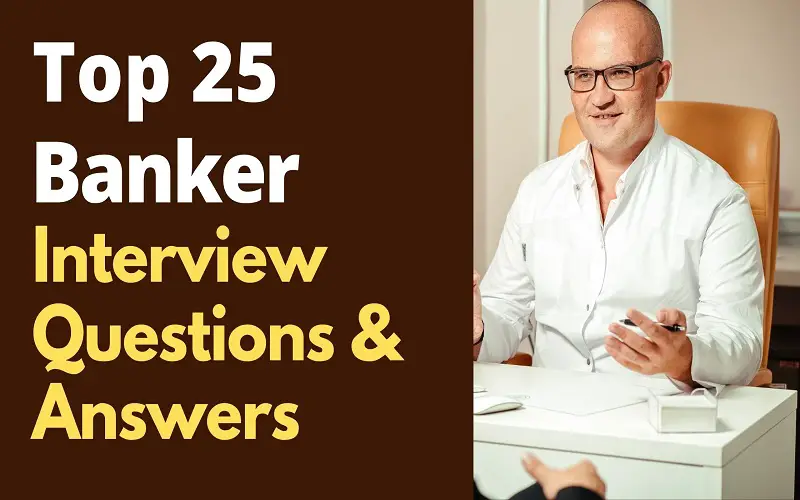Bankers, alternatively referred to as retail bankers, interact with clients daily, assisting them with opening checking and savings accounts, authorizing loans, and transferring money. Additionally, they consult with clients regarding banking products and services. When you interview for a banker position, the interviewer will assess your banking skills. The responses you provide can play a significant role in determining whether or not you receive a job offer. The best way to increase your chances of succeeding in a banking interview is to familiarize yourself with the most frequently asked questions. Then, prepare effective responses before the interview to answer them naturally. This article will discuss some of the most frequently asked bankers’ interview questions and provide examples of how to respond to them effectively.
1. Why Do You Want This Job?
Finance has always piqued my interest, and I am constantly learning more about the subject. Banking is something I’m very interested in. This position, I believe, will allow me to pursue my interests more thoroughly and at a higher level. I also believe I have what it takes to assist this bank in maintaining or exceeding its current standards. Based on my interests and skills, a career in personal banking seemed like an obvious choice when I started college. I have excellent communication skills and am good at problem-solving and making decisions under pressure. I believed that I could use these skills to give people good financial advice and help them achieve financial security.
2. What Are The Bankers’ Responsibilities And Roles?
Within a bank, bankers provide services to consumers. Bankers are frequently the initial point of contact for customers when entering the bank. As a result, they must be able to create an environment that is welcoming to both new and old consumers. While the activities of bankers vary according to the organization of different financial institutions, their primary responsibility is to work closely with clients in determining and meeting their banking needs.
A banker highlights the benefits and drawbacks of their institution’s products and services while presenting them to their clients to meet their individual needs. In some situations, they may be responsible for all parts of a client’s portfolio, including loans, investments, and insurance.
3. How Would You Respond If A Customer Has Been Overcharged For A Withdrawal Fee?
If this circumstance arose at work, I would ensure that the customer gets the time and space necessary to express their thoughts and feelings. I’d apologize for the inconvenience, inform them of the bank’s policies, and explain how I intend to resolve it. After I’ve refunded the customer, I’ll describe the actions they should take if the problem occurs again. I would then provide them with a customer care number and inform them that they may contact me directly if they ever needed assistance.
4. What Are The Most Critical Attributes Of A Successful Banker, In Your Opinion?
To be a great banker, you must be sales-oriented, have excellent customer service abilities, and efficiently resolve people’s problems by staying patient and persuasive. Additionally, it would help if you made quick decisions under duress in this work atmosphere. Additionally, a strong work ethic requires interpersonal, time management, and organizational skills. Finally, a skilled banker should have a working grasp of several software applications.
5. How Would You Convince A Customer Who Is Unsure About Our Banking Services?
First, I would establish trust with the client and address their immediate concerns. I’d be able to gauge the client’s particular requirements based on our interactions. After learning more about them, I would offer services that seemed to fit their lifestyle. For instance, if a frequent traveler came into the bank, I would inform them about the bank’s reasonable overseas withdrawal fees. I intend to emphasize how our services may help clients solve a specific problem.
6. When You Were A Banker At Your Former Employer, What Were The Biggest Challenges You Faced?
I worked in an area where the majority of residents were illiterate. As a result, I had a difficult time communicating with them. The majority were older individuals who could not transact using their ATM cards. However, I was patient with them and asked numerous questions to ensure they understood what I was saying. This was extremely difficult because I spent a lot of time explaining it to them, but because most of them were repeat clients, I felt encouraged while serving them.
7. Give An Example Of When You Dealt With A Customer In A Delicate Financial Situation With Respect And Discretion.
While working a weekend shift with a long line of clients, I had a customer come in who had difficulty accessing their accounts. I noticed that the customer’s accounts had been frozen during my investigation. Recognizing that they were already anxious and that this may be an awkward situation for them, I requested that they accompany me to a computer at the end of the front desk, away from the
8. How Would You Describe Your Day-To-Day Routine As A Banker?
My days typically begin quite early in the morning. I then arrive at work very early and sit at my desk. Customers begin to arrive with a variety of needs. I assist clients in opening new checking and savings accounts and tailoring them to their individual needs. Additionally, I perform various tasks assigned by my bosses, such as producing reports.
9. When A Client Has Difficulty Comprehending The Financial Scenario, You Explain To Them What You Do?
Whenever I’m dealing with a consumer, I usually try to keep things as simple as possible unless I’m aware of their higher level of financial literacy. When this method is no longer sufficient and it becomes evident that the customer cannot comprehend it, I will attempt to find a different way to make it more applicable to them. I make an effort to get to know clients when they walk in and receive service at the desk to have a foundation for future interactions like this.
10. What Are The Many Forms Of ‘Fixed Deposits’ Available?
Fixed Deposits’ are classified into two categories.
- Deposits with a Special Term: In this sort of ‘Fixed Account,’ the interest generated on the deposit is compounded quarterly and added to the principal amount. This sum is accumulated and repaid alongside the deposit’s principal upon maturity.
- Term Deposits regularly: In this sort of ‘Fixed Deposits,’ the investor’s account is rewarded with the earned credit once a quarter. Interest may be credited every month in some instances.
Interest generated on fixed deposits is not taxable. Additionally, you can borrow against your fixed deposit.
11. What Red Flags A Customer May Not Be A Dependable Loan Recipient When Applying For A Loan?
Any loans I approve must be responsible, which benefits both the bank and the borrower. Along with checking for late payments or defaulted loans, I always check the applicant’s credit card utilization and debt-to-income ratios. High utilization indicates that the applicant is likely over-leveraged and at risk of default. When dealing with high-risk applicants, I always choose the safest loan options for the bank and decline the loan request if no suitable offer is available.
12. Briefly Describe Your Experience?
I began my career as an intern at Equity Bank, where I gained valuable knowledge regarding account opening and communication protocol. I then worked as a personal officer at Kenya Commercial Bank, responsible for account openings and customization. I learned how to deal with various clients here, which has helped me thrive in my job. I’ve led a team of bankers in various capacities and achieved outstanding outcomes with my team due to my strong leadership abilities.
13. What Is An ILOC?
It is a letter of credit or a contract between a financial institution (Bank) and the recipient. The ILOC letter is non-cancelable and guarantees payment to the party. It compels the bank to pay against ILOC-compliant drafts. It is valid for the indicated time. For example, a small firm would contract with a foreign supplier for a certain item and ask their banks to create a letter of credit for the transaction. The buyer’s bank would then forward the letter of credit to the seller’s bank, finalizing payment arrangements and arranging shipment.
14. What Is A Home Equity Line Of Credit?
A home equity loan, alternatively referred to as a second mortgage, permits you to borrow money against your house’s equity value. For instance, if the home is worth $25k and you paid $50k for it. Your mortgage balance is $100k. The $50k represents equity, which is the difference between the home’s actual value and the amount owed to the bank. The lender will provide you with a loan based on your equity. Typically, the applicant will receive 85 percent of the loan amount based on its equity, taking your income and credit score into account. In this example, you will receive 85% of $50k, or $42k.
15. What Strategies And Attitudes Are Required For This Position?
A banker must be results-driven. This will assist them in meeting the bank’s objectives. Additionally, they should develop a strategy to ensure optimum client satisfaction. They must have a positive attitude to influence other employees positively. They must have a creative attitude to develop financial solutions for clients’ demands while fostering innovation. Additionally, they must be persuasive and possess strong communication skills to persuade customers about the services they are delivering.
16. As A Banker, What Are Some Of The Major Challenges You Anticipate?
I don’t anticipate any unique difficulties in this position other than the standard professional difficulties. This comprises stress resulting from the current activity, including internal and external pressures and government pressures. Banking has grown more goal-oriented, and success is now measured in achievement regardless of limits. Bankers have a widespread impression that they are understaffed, resulting in excessive workload – this is a severe issue, as it can have a detrimental effect on a banker’s health owing to stress. This is a common challenge, and I believe that we can overcome all of the current obstacles if we work together.
17. Tell Me About Four Distinct Types Of Bank Accounts And How They Differ.
The most common type of account is the standard checking account, which enables customers to deposit, withdraw, and spend funds. Savings accounts typically earn a higher interest rate on money deposited in them and have transaction limits in a given period. Certain banks offer reserve or money market accounts to bridge the gap, offering higher interest rates and no transaction limits than checking accounts. Finally, funds must be held for an extended period to earn a higher interest rate in a CD account.
18. When You Refer To “Foreign Draft,” What Exactly Do You Mean?
For the most part, the foreign draft is used to send money to countries outside of the United States rather than foreign currency. It can be acquired from commercial banks, which will charge you according to the rules and regulations of their respective banks. When sending money, many choose to use a ‘foreign draft’ since it is cheaper and safer than other methods of sending money. It also allows the recipient to access the funds more quickly than a check or cash transfer.
19. What Are Banking Software Programs Accessible In The Market?
Listed Below Are A Few Examples Of Banking Software Programs:
- Internet banking system: Internet banking allows clients and financial institutions to transact online.
- Customers can complete basic transactions using an ATM (Automated Teller Machine).
- Core banking system: A networked bank branch service. Customers can use this card at any branch.
- Loan management system: The database collects and tracks all customer information.
- Credit management system: A credit management system handles credit accounts, assesses risks, and determines credit limits.
20. With The Banking Environment Constantly Changing, What Do You Believe The Banking Sector’s Needs Are?
Given the current economic climate, I believe banks must work to ensure an equitable distribution of savings to all sectors to stimulate growth. Additionally, we require professional and modern management techniques to ensure the efficiency of banking processes. Banks must also develop strategies to meet the credit needs of all segments of society and refrain from lending to frequent defaulters.
21. How Do You Maintain Your Work Motivation?
Finance has always sparked my attention, and I am continually acquiring new knowledge in the field. Banking is an area in which I am interested.
I enjoy fulfilling objectives and deadlines. I’m compelled to work more to outperform my aims and meet my deadlines early. These two factors have contributed to my enjoyment of my profession, as I consistently fulfill my objectives. I enjoy using my talents to provide sound financial advice and assisting others in achieving financial security. This sector has aided in developing my leadership and communication skills and my desire to lead teams and delicate tasks to accomplish defined objectives.
22. What Impact Has Mobile Banking Had On The Way Banks And Customers Interact?
How Has Technology’s Role In Banking Evolved Throughout Time?
Customers using mobile apps to perform routine chores such as checking their accounts and depositing checks have altered the average customer’s expectations when they approach the front desk. This implies that when I speak with a customer, it is more frequently to assist them in resolving an account issue they could not resolve on the digital app. This, I believe, makes my job more gratifying, as I can actively address problems for clients for a greater percentage of the time I am working.
23. What Is Your Most Significant Career Accomplishment?
My greatest accomplishment at my previous employer was suggesting ways to help older persons who had lost their vision and could not access our services, such as automated teller machines. We witnessed a 19% rise in revenue during the first six months after implementing my ideas, the highest growth in our bank. Due to this program, I was named ‘Employee of the Year.’
24. Give An Example Of An Occasion When You, As A Banker, Failed In Your Duties?
While working with a simple consumer at one time in my career, I failed to inquire about his comprehension of what I was saying. He made a mistake since he didn’t understand what we were saying. Although they keep assuring me that they understand, this experience taught me to always ask as many questions as possible when dealing with such consumers.
25. Based On Your Abilities And Experience, Why Do You Believe You Are Qualified For This Position?
I thought I would be a good fit for this position after thoroughly examining the job criteria and investigating your company’s policies and history. Specifically, I feel that my customer service, communication, and problem-solving abilities will enable me to serve your consumers efficiently. I am committed to providing customers with the information and resources necessary to make sound financial decisions and investments. I’ve learned to prioritize the customer throughout my career while honing my sales skills.
Conclusion
These top 25 personal banker interview questions and answers should help you land your next job interview. In addition, prepare to ask questions about the job and demonstrate your enthusiasm and curiosity to the interviewer. Also, arrive at the venue early to familiarize yourself with the surroundings. Don’t forget to dress nicely to make a good first impression on the interviewers. Finally, maintain the appropriate body language to convey confidence, dedication, and intelligence.




